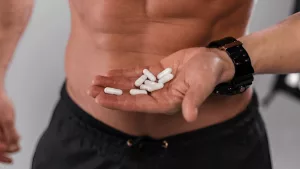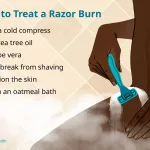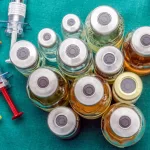Testosterone influences numerous facets of your well-being, from sexual performance to susceptibility to certain illnesses. You can often raise your levels naturally by doing resistance training and ensuring adequate intake of specific nutrients.
Testosterone is a steroid hormone primarily synthesized in the testicles and ovaries, with smaller amounts produced by the adrenal glands.
During puberty in people assigned male at birth, testosterone drives many of the physical changes such as increased muscle, voice deepening, and body hair growth. People assigned female at birth also produce testosterone but in smaller amounts and typically have higher estrogen levels, another key hormone.
Maintaining appropriate levels is crucial throughout adulthood. In adult men, adequate testosterone is important for overall health, impacting disease risk and sexual function.
Moreover, raising testosterone to healthy ranges can help increase muscle size and strength.
Interestingly, testosterone also has a meaningful role in women’s health and sexual functioning.
Below are eight science-backed strategies to boost testosterone naturally.
1. Exercise, especially resistance training
Physical activity is among the best ways to ward off many lifestyle diseases. It also tends to raise testosterone.
A 2020 review noted that the impact on testosterone depends on factors like exercise modality and how intense the training is.
Strength training, such as lifting weights, has been found to elevate testosterone in the short term.
High-intensity interval training (HIIT) can also be very effective, though most forms of regular exercise will have some positive effect.

2. Consume adequate protein, fats, and carbohydrates
Your diet can influence testosterone and other hormone levels.
Sufficient protein intake supports healthy testosterone and helps with fat reduction, which can be beneficial. On the other hand, chronic dieting or overeating may lower testosterone.
Eating healthy fats appears to support hormone balance and testosterone. Some studies indicate that very low-fat diets might reduce testosterone.
Thus, a balanced diet centered on whole foods is preferable. A sensible mix of protein, fats, and carbs will help optimize hormones and overall health.
3. Reduce stress and cortisol
Research frequently underscores the harms of chronic stress, which raises levels of the hormone cortisol.
Acute spikes in cortisol can rapidly lower testosterone. These hormones often act in a see-saw fashion: as cortisol climbs, testosterone tends to fall.
Stress and elevated cortisol can also boost appetite, promote weight gain, and increase harmful visceral fat — changes that may adversely affect testosterone.
To support both overall health and hormones, try managing stress through regular activity, sufficient nightly sleep, and stress reduction techniques.
4. Boost vitamin D
Vitamin D is a vital micronutrient involved in many bodily functions. Despite its importance, up to a large portion of people are deficient.
Some studies link low vitamin D with reduced testosterone.
A 2020 review reported that vitamin D supplementation raised testosterone and improved erectile issues in some trials, though findings are mixed and more research — including a 2023 study — show inconsistent results.
To keep vitamin D at healthy levels, get regular sun exposure or consider a vitamin D3 supplement per a healthcare provider’s guidance.
5. Think about supplements
While the value of multivitamins is debated, certain supplements may help support testosterone.
In a study, zinc supplementation raised testosterone and improved sexual function in postmenopausal women who had low zinc levels.
Another review indicates zinc could benefit men with low testosterone and infertility, especially if they have zinc deficiency.
Other evidence suggests several herbal supplements — including saw palmetto, ginger, and ashwagandha — might help support testosterone, though further research is required.
If you opt for supplements, consult a healthcare professional first, particularly if you have health conditions or take medications.
6. Prioritize high-quality sleep
Good sleep is as vital as a healthy diet and regular exercise.
Sleep quality can substantially influence testosterone. A large study of 2,295 adolescent boys and men found poor sleep was associated with lower testosterone levels.
»MORE:How Many Hours of Sleep Do You Really Need?7. Limit exposure to estrogen-mimicking chemicals
Other lifestyle factors can sway your hormones. For example, an active sex life is helpful for regulating sex hormones and testosterone.
Excessive contact with estrogen-like chemicals can also impact testosterone. Try to reduce everyday exposure to bisphenol-A (BPA), parabens, and other chemicals found in some plastics.
8. Monitor alcohol consumption
The link between alcohol and testosterone is complicated. Research indicates heavy alcohol use can lower testosterone.
Testosterone may fall within about 30 minutes after drinking. Chronic heavy drinking can impair testicular function and cause testicular shrinkage.
Interestingly, studies in adolescents and young men found that testosterone levels can predict alcohol dependence or early initiation of drinking; higher testosterone in saliva or blood is linked to heavier drinking and earlier onset.
Bottom line
Male testosterone peaks around age 19 and naturally declines with time. Levels typically fall by about 1% to 2% per year after 30, though they may level off in the 40s or later.
This decline matters because solid research links low testosterone with obesity, greater disease risk, and earlier mortality.
Healthy testosterone is also important for people assigned female at birth, alongside other hormones like estrogen and progesterone.
Adopting a balanced diet and healthy lifestyle using some of the approaches above can help optimize testosterone and improve overall health.

























Leave a Reply
You must be logged in to post a comment.